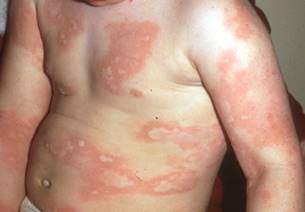What are hives?
Hives are also called urticaria. They are itchy, red swellings of the skin that can occur on any part of your body. They are generally red areas of skin with serpiginous borders. They often are itchy or burn. They can occur In the picture below there are raised welts in the center of the lesions. Hives usually come and go, and do not persist in the same area for days, but move from one area to another over twenty minutes or so. They are aggravated by pressure or scratching, and tend to be worse with heat, although they can be worse with cold exposure.

About 20% of people suffer from hives at some point in their lives. Hives are sometimes caused by food and drug allergies. Drugs that cause hives frequently include aspirin, all NSAIDs (non-steroidal anti-inflammatory drugs such as ibuprofen and Naprosyn®), codeine, morphine, dextroamphetamine,[7], penicillin, clotrimazole, trichazole, sulfonamides, anticonvulsants, cefaclor, piracetam, vaccines, and antidiabetic drugs.
They can be the first sign, or a part of anaphylaxis, which is a severe, sudden, generalized allergic reaction that can result in your having difficulty breathing, shock (a lowering of your blood pressure), and even death. They are related to angioedema, which is a deeper swelling of the skin.
Hives can also sometimes be associated with conditions such as thyroid disease, hepatitis (liver infections), or connective tissue diseases such as lupus. Sometimes, hives can occur for no apparent reason (idiopathic). If you have hives, consultation with an allergist for possible food or drug allergies may be required to diagnose, and to treat this condition and to prevent future, more devastating reactions from occurring.
For idiopathic hives, treatment with antihistamines H1 and H2 blockers, sometimes in combination with other medicine such as leukotrienes, may often control your symptoms. Certain drugs that modulate the immune system (cyclosporine, hydroxychloroquine, dapsone) have been used for chronic hives but these drugs may be toxic. Oral steroids such as prednisone are unsuitable for chronic use. Recently, Xolair® which is a biologic treatment given by injection has been used to treat chronic persistent hives whenconventional treatment is not working , and has often been effective.